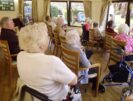
Monday 18th March 2024
Helping others draw on their resilience
Louise Morse
A few days’ ago, my newest grandson, Bodie, celebrated his first birthday. He’s growing up with his family in California and every week they send me photographs and little videos. One of the latest shows him taking his first steps; he stands, balances, totters a few steps and falls. Then he gets up and tries again. Watching him, I marvelled at the resilience he has and how it’s encouraged by the love of his family. Old age is a time when people need to be encouraged in the same way, because although they may be lifelong believers, they can begin to lose confidence in their ability to cope with the losses they are experiencing, including friends and families, as well as physical decline.
Bodie’s early years are the foundation for the growth of his character, and he is surrounded by an extensive, loving family and community. He is a happy, confident boy, unfazed when he meets new people. But not everyone experiences a healthy attachment in those early years. Sir John Timpson (founder of the famous chain of shoe repair shops) and his wife Alex were foster carers for 15 years before they learned about attachment. They learned that during the early years positive parental attachment forges neural pathways in the brain and provides the basis for social behaviour that will be developed through life. (Their shops sell brilliant little booklets to help others; they are factual, accurate and helpful.)
Some older people will cope better than others with the challenges of old age, but everyone will need encouragement and help in drawing on their resilience. It isn’t true that the faith of all older people is stronger because of their experiences – they often need more, not less support. Especially those who are living on their own.
And we all need to remember that our ‘enemy the devil prowls around like a roaring lion looking for someone to devour. Resist him, standing firm in the faith, because you know that your brothers throughout the world are undergoing the same kind of sufferings,’ (1 Peter 5:8). One of my friends, a man in his early 70s known as a stalwart of the faith, described the negative feelings he was having about himself and his achievements. Clearly, they weren’t from the Holy Spirit, because He works within us to make us like Jesus, and Jesus never doubted His worth for a moment. There is a difference between the conviction of the Holy Spirit that leads to repentance and peace and growth, and the accusations of the devil that lead to self-diminishment and sorrow.
As a Christian counsellor I chose the cognitive behavioural therapy approach because it mirrors the Scriptures, and in my counselling practice over the years I’ve discovered increasingly the power of God’s Word to shed light and reinforce the truth. Hebrews 4:12 says, ‘For the word of God is living and active and full of power [making it operative, energizing, and effective]. It is sharper than any two-edged sword, penetrating as far as the division of the soul and spirit [the completeness of a person], and of both joints and marrow [the deepest parts of our nature], exposing and judging the very thoughts and intentions of the heart,’ (AMP).
It also helps the divide between feelings and facts. Feelings can be so strong that they hide, or distort the facts. Feelings like this often spring from a warped perspective, often not even related to the current situation; they are like hot-buttons from the past.
In helping an older person draw on their resilience, the first importance is to listen attentively. Don’t dismiss concerns with phrases like, ‘you’re being too sensitive,’ but instead, reflect back what he’s saying, showing you have heard and understood.
My friend (let’s call him Bill) was able to recall some of the things he’d achieved and people he’d helped, which began to balance his perspective. Revisiting some of the tough situations he’d come through helped too; how God had guided him, how he had known it was the right thing to do and had stuck by that, and the positive outcome – eventually. It’s rather like Joshua’s stones of remembrance on the shore of the Jordon River (Joshua 4: 1-8), erected as a permanent memorial to how God had led Israel through by parting the waters.
We recalled the characteristics that had helped Bill – his patience, his insight, his doughty stickability, and his sense of humour. It was like putting back building blocks that had been knocked apart.
It’s good for all of us, whatever our age, to visit our ‘stones of remembrance’ now and again. Life is not easy, and we need to strengthen our spirits and build our resilience so that when the next challenge comes, we are ready for it.
More from Pilgrims' Friend Society

My father rejects his diagnosis of dementia. Why is this? >

Dementia Information Pack >
A series of leaflets on different aspects of dementia, including diagnosis, caring, managing challenging behaviour, caring for the caregiver, and much more....

Could It Be Dementia? >
This book insists that losing your mind doesn't mean losing your soul. It offers information, practical advice and reassurance by putting dementia firmly into a Christian context.


































